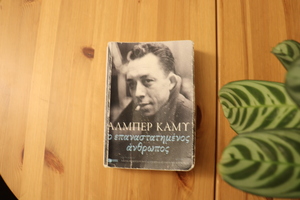
I do not know why I picked The Rebel by Camus, I never know why I pick my books, but for sure it is one of the most challenging reads I have had for a long time. The challenges laid on the the concepts that were introduced and referenced, which I had to look up and digest. Not an easy philosophical essay but surely worthy.
Camus describes rebellion and revolution historically, metaphysically and even through art. Starting with a historical overview from the metaphysical revolutions of the 18th and 19th centuries, he attempts to examine and define the nature and consequences of uprisings and revolutions. He draws the lines within which it is still possible, if at all, to accept violence in revolutions and humans.
The introduction of the book opens with an aphorism: “Man is the only creature who refuses to be what he is” and continues with the question: “What is a Rebel?”. A rebel is a human that says no and decides that a limit has been reached, while at the same time says yes to the certainty of a right.
Since the dawn of time, humans try to prevail over natural phenomena and stay alive. They created god and appointed the messiah to convey his commands through the regiment and morality. Then they rebel against the same authoritarian god they created. By killing ‘God’, man creates the King and entrusts the order and meaning to him. The king took the place of the god but the arbitrariness of this god-sent king leads to yet another revolution. Respectively, the authoritarian logic and inevitably by nihilism replaces the king. If there is no god and his god-sent representative dies in the guillotine, then there is no morality, and if there is no morality then everything is permissible, even murder. In the essence, man revolts against his own fate, which is death.
As we continue through this challenging essay, it is becoming obvious to us that destruction and death in every revolution were and probably are inevitable. From the Tsarist Russia of the 19th century to socialism and Lenin, who in the name of the utopia promised by Marx, destroyed and adopted all those means which he ordered to be expelled from the new world, there are many examples of the absurdity of the revolution.
Justice and freedom are the two demands at the beginning of every uprising. The history of Europe shows that these demands always come into conflict. Absolute freedom is the right of the strongest to prevail. Absolute justice destroys freedom. To be effective, the two concepts must find their limits in each other. No one is considered free if is not at the same time fair, nor fair if he is not free. Without law, no freedom. Absolute freedom, especially of crime, presupposes the abolition of human borders. Revolution, without limits other than historical effectiveness, means endless enslavement. The highlight of this absurdity of a revolution that allows everything in the name of logic and nihilism, was German fascism.
The read makes you wonder, will the oppressed always become the oppressors by denying the right to justice and freedom, for which they revolted in the beginning?
Camus claims that the only answer to this questions is life itself. He asks from every human, potentially a rebel, to commit their demands and desires only to the very life that all humans share under the rising sun : " […] instead of killing and dying in order to produce the being that we are not, we have to live and let live in order to create what we are".
Human uprising, at any level, is a protest against death. We are born and we exist with the death penalty upon our heads from day one. Humans revolt not for immortality, but for it is the only action that claims the meaning of this irrational life.
The Rebel is a philosophical approach to resistance in general. It uses historical examples and philosophical theories to present the fates of previous revolutions. It supports that creation and creativity - in all forms and levels - are the only revolutions not destined to become tyranny. This is a timely read for anyone who wants to understand where humans went wrong in the past as well as what is going wrong in the present.